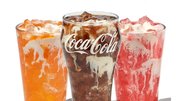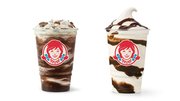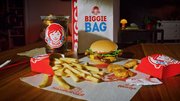Article
CKE, Carl's Jr., Hardee's ... a plant-based love story
It's well-established now that QSR plant-based mania is in full swing. But how do the category's firmly ensconced and very beef-based burger brands even go about the process of choosing and taking a plant-based entry to market? CKE pulled back the "curtain" on their process behind Hardee's upcoming Beyond Famous thickburger debut in October.

August 29, 2019 by S.A. Whitehead — Food Editor, Net World Media Group
With the dawn of a national QSR chain's plant-based chicken offering, in KFC's Atlanta test earlier this week, QSRs in general turned a pretty pivotal corner when it comes to alternative center-of-the-plate proteins. The meatless "meat" race that started with burger entries from Carl's Jr. and White Castle, has now accelerated to a fevered pitch of plant-based or vegan everything in the fast food realm, including sausage, "ice cream," and even pizza toppings.
But how does a QSR's consideration and eventual adoption of a plant-based menu addition all unfold inside the chain and how do brand leaders ultimately choose which type of meat substitute their individual brand will use to satisfy the cravings of its unique customer base?
"It's been a joyful and a hair-pulling-out venture!"
-Owen Klein, CKE Restaurant Group
This website thought its readers would be interested to know more about that, so we asked CKE Restaurant Group to pull back the curtain a bit on its process of choosing which product to use for its upcoming Hardee's debut of new Beyond Meats-concoctions for its Beyond Famous Thickburger and sausage biscuit.
Granted, Hardee's had the advantage of watching its more experimental brother-brand, Carl's Jr., take the plant-based plunge about eight months ago when the Beyond Famous Starburger debut went insanely well. But, according to CKE Vice President of Global Culinary Innovation Owen Klein, the plant-based burger and sausage Hardee's will debut in October had to stay true to that brand's audiences' preferences.
 |
| Photo: Provided. |
For instance, Hardee's sells more than 250 million biscuits at its 1,800 stores annually, so brand leaders knew they not only had to have a great-tasting sausage alternative to sit on that popular bread offering, but they also needed a burger that would stand up to the charbroiling that its thickburger fans absolutely demand.
"It just made sense to go to test market with that (biscuit) product, so we had to develop a breakfast sausage patty that did that (regular sausage biscuit) justice," Klein said in an interview with this website. "For instance, at Carl's, we used our best-selling cheeseburger to launch the Beyond Meat patty and that helped to bridge the gap with Carl's fanatics, ...
"So it's really just finding that special product and the messaging behind it — that was the game plan we went forward with and it worked incredibly well. ... It's really what we do from CKE restaurants' perspective -- we take best practices from each brand and apply them to the other brand if they're not already doing that."
Flexing to address the 'flexitarian'
But Klein emphasized that staying true and fully aligned with Hardee's persona, even in its plant-based offerings, was Job No. 1 when it came to creating these two new products. Unlike the edgy innovator that Klein describes the West Coast-centered, Carl's Jr., as being, Hardee's is more about traditional, "hometown" and familiar flavors.
Similarly, both Carl's Jr. and Hardee's maintain a strong menu focus on the demands of so-called, "flexitarians." That's based on CKE research that ultimately made Carl's Jr. an early starter in the plant-based category, showing an overall quick-service shift to more plant-based eating. In the case of Hardee's and Carl's Jr., Klein said they see the flexitarian diner as the one who is basically a meat-eater who also hankers for plant-based proteins "a couple of times a month. "
Similarly, he said each brand's feedback loop from customers and franchisees about this trend also made it clear that change was afoot when it came to burger consumption as usual.
"They're changing and they're changing big time," Klein said of customers' eating preferences. "Obviously — depending on how the October (Hardee's Beyond Famous Thickburger and sausage) tests go — we'll see what kind of resonance we get with the Hardee's consumer. But we're really continuing to innovate around options that fit the needs of multiple demographics with multiple dietary needs and not just for the beef burger. ... It's really developing products that fit both buckets — that's the biggest challenge. ... It can't just be better-for-you halo effects. It has to be a Hardee's-type product."
Impossible, Beyond, or even beyond that
But then, there's also the weighty decision of where to turn for the plant-based option a brand develops between the two main players in this space of Impossible Foods and Beyond Meats, or even creating a proprietary blend in-house, like Farm Burger.
"We batted that around for some time, within my team and the brand's marketing team," Klein recalls over the discussion concerning whether to develop an in-house plant-based option. "But what helped us a lot was really leveraging something that fit in with Carl's, and soon to be, Hardee's menu ... that had brand equity as a player in plant-based. That's why Carl's found a fit right away because of Beyond (Meat's) presence in the California market. ...
"So with Beyond, in particular, it really checked all boxes for us — from flavor and texture and even the development perspective. Beyond has not just been a supplier to us, they've been a partner and really worked through some of the big challenges in getting these products to market and getting there quickly. ... It's been a joyful and a hair-pulling-out venture!"
For these two brands' burger substitute, the texture was particularly important, Klein said, along with that "halo effect" customers take away from eating a product that's soy- and GMO-free. But probably most important was the cooking method.
"It (Beyond Famous Thickburger) responds incredibly well to charbroiling, which is something we're incredibly passionate about at both brands, as well as standardizing the charbroiling process at the two brands which is even more consistent today. So it checked every box we wanted it to."
So with Carl's Jr.'s plant-based burger success already in the brand's history books, and great expectations for similar success at Hardee's, both brands and their parent organization are confident they're well set up for a plant-based future in fast food. And yes, when it comes to these two burger-centered chains, plant-based is still very much a trend that's here to stay.
"I think, versus a fad, this is a trend and movement even, that's here to stay," Klein said. "That's why we never approached this as an LTO, but more as an evergreen. ... And as the tech evolves, with some of the other types of proteins, well, those could be opportunities for the future."
Feature photo: iStock
About S.A. Whitehead
Pizza Marketplace and QSRweb editor Shelly Whitehead is a former newspaper and TV reporter with an affinity for telling stories about the people and innovative thinking behind great brands.
 ChatGPT
ChatGPT Grok
Grok Perplexity
Perplexity Claude
Claude








